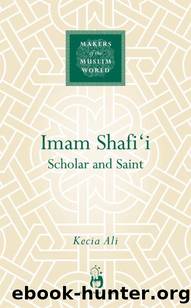Imam Shafi'i: Scholar and Saint (Makers of the Muslim World) by Kecia Ali

Author:Kecia Ali [Ali, Kecia]
Language: eng
Format: epub
Publisher: Oneworld Publications
Published: 2011-10-31T18:30:00+00:00
SOURCE RELIABILITY
Those who oppose the use of hadith as a legal source focus on its reliability. Thus, Shafiâi devotes considerable attention to how one detects defective hadith. Most issues concern the reliability of transmitters. Shafiâiâs interlocutors are concerned that hadith are epistemologically less certain than the Qurâan; therefore, some hold, they should not be used. Shafiâi objects. In the Risala, the Summation, and Disagreements between Hadith, he asserts that hadith are superior to witness testimony, which all accept as a basis for adjudication in certain matters. This is true even though a witness could be mistaken or lying. Even in capital crimes one must rely on witnesses; one can take life based on testimony. So if one employs more stringent standards for accepting a hadith transmission than for eyewitness reports â standards that rely not only on personal uprightness but also facts such as memory and clear understanding â then accepting hadith as proof of the Prophetâs words and deeds is even better justified.
Of course, not all hadith are reliable. One strategy that Shafiâi accepts, but where possible avoids, is to reject a defective tradition. Although one can reject a defective tradition to remove a perceived conflict between it and a Qurâanic text, the concept of defective traditions is of most use when attempting to reconcile traditions that conflict with one another. Shafiâi devotes a portion of the Risala to laying out things that make hadith texts unreliable. For the most part, he focuses here on unreliable transmission. In cases of seeming contradiction between hadith, one cause might be the unreliability of one of the texts. If so, one can discard it:
one does not accept a hadith unless it is well established, just as he does not accept among witnesses any but those whose probity is known. So if the hadith [in question] is unknown or transmitted by an undesirable person, it is just as if it had not been transmitted at all, because it is not firmly established.
(Disagreements between Hadith)
But one has the sense that he makes this point as a sop to his opponents: though he certainly acknowledges that not all hadith are reliable, he is far more interested in showing how perceived conflicts are only apparent rather than in throwing out suspect texts. In any case, this mechanism does not apply to the Qurâanic text; apparent conflicts within the Qurâan or between Qurâan and an authentic sunna, or between two authentic sunnas must be resolved using other strategies.
Download
This site does not store any files on its server. We only index and link to content provided by other sites. Please contact the content providers to delete copyright contents if any and email us, we'll remove relevant links or contents immediately.
Machine Learning at Scale with H2O by Gregory Keys | David Whiting(4282)
Never by Ken Follett(3921)
Harry Potter and the Goblet Of Fire by J.K. Rowling(3834)
Unfinished: A Memoir by Priyanka Chopra Jonas(3361)
Fairy Tale by Stephen King(3355)
The Man Who Died Twice by Richard Osman(3055)
Will by Will Smith(2891)
Rationality by Steven Pinker(2342)
It Starts With Us (It Ends with Us #2) by Colleen Hoover(2318)
Can't Hurt Me: Master Your Mind and Defy the Odds - Clean Edition by David Goggins(2309)
The Dark Hours by Michael Connelly(2290)
The Storyteller by Dave Grohl(2212)
Friends, Lovers, and the Big Terrible Thing by Matthew Perry(2208)
The Dawn of Everything: A New History of Humanity by David Graeber & David Wengrow(2182)
The Becoming by Nora Roberts(2178)
The Stranger in the Lifeboat by Mitch Albom(2104)
Cloud Cuckoo Land by Anthony Doerr(2080)
Love on the Brain by Ali Hazelwood(2046)
Einstein: His Life and Universe by Walter Isaacson(1997)
